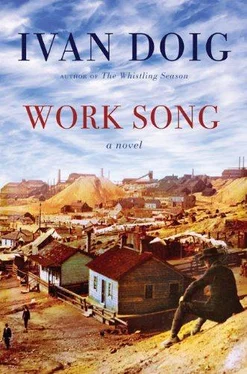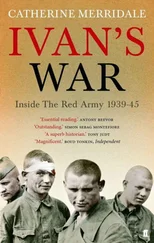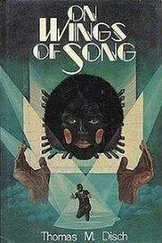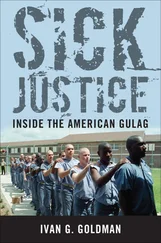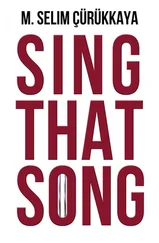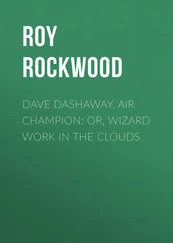“Quiet!” Sandison boomed, the word resounding in the enclosed room. “You tell them on the top floor of the Hennessy Building that they maybe run everything else in town, but not this library. Clear out of here, and I mean now.”
The pair cleared out, but not without glares over their beefy shoulders at me.
Now all I faced was the stormcloud of beard. Sandison inspected me as if having missed some major feature until then. “Miss Runyon told me you were taking an unconscionably long time down here. Morgan? Are you up to something?”
“Sandy, I swear to you, I am an utter stranger to the battles of Butte.” That left Chicago out of it.
He shook his head. “If you weren’t such a bookman, I wouldn’t have you on the payroll for more than a minute.” Turning to go, he said, as if he was ordering me to head off a stampede: “Get the damn corkboard rigged up so we don’t have to hear any more from that old heifer Runyon about it.”

I PICKED AT MY FOOD that suppertime, drawing a look of concern from Grace. “More turkey, Morrie? It’s not like you to be off your feed.”
Down the table, two sets of bushy gray eyebrows squinched in similar regard of me. Neither Hoop nor Griff asked anything about my disturbing day, however, in respect of our pact not to bother Grace’s head about the goons’ interest in me. Pushing away my plate, I alibied: “A touch of stomach disorder, is all. Nothing a restful evening in my room can’t fi x, I’m sure.”
Upstairs, flat on my back atop the dragon coverlet while I stared at the ceiling and waited for inspiration of some sort to show up, I never felt less sure of fi xing anything. The zigzags of life were more puzzling than ever. There I lay, in the most comfortable circumstances I had known for a long while, with work that nicely employed my mind, and the goons of the world were sure I was a secret operative for the most radical wing of the laboring class. It was dizzying. If America was a melting pot, Butte seemed to be its boiling point. The Richest Hill was turning out to be also a Cemetery Ridge of copper to be fought over, and some trick of fate had dumped Morris Morgan-all right, Morgan Llewellyn-right in the middle of it. Not the spot I thought I was choosing when I stepped down from that train.
A train runs in both directions, the ceiling reminded me, as boardinghouse ceilings tend to do. Lying there looking up at the map of plaster imaginings, I felt an old restlessness. It was a lamplit evening in the Marias Coulee teacherage, when I knew I was losing Rose, that a faint stain in the beaverboard ceiling seemed to suggest the outline of Australia. Even here in Grace Faraday’s well-maintained accommodations, did that swirl in the plasterer’s finishwork over by the window resemble South America?
Fate comes looking for us, often when we are most alone. Stealthily the conclusion I was waiting for crept down from the ceiling and took shape in the corner of the room. My gaze followed it to my satchel, shabby reliable companion in a portable life.
I swore softly to myself. Ordinarily I do not use profanity, but that was the least of what had been fanned up in me by the bluster from Eel Eyes and Typhoon Tolliver. Bouncing off the bed, in a hurry of resolve now, I crossed to where the satchel waited. Grappled it open wide. Dug to the bottom of it, past spare socks and the poetry of Matthew Arnold, to where they lay.
Brass knuckles. The “ Chicago pinky ring,” weapon of choice for the streetwise combatant facing an unfair fight.
It had been years since I needed to resort to these, but they never aged. As I tried them on now, they fit across the backs of my hands cold and secure. Even the most vicious street fighter had to hesitate at the dark sheen of armor on a fist, the set of nubs that could gouge into skin like a can opener. Of course, knuckles of metal did you any good only within striking range of an opponent. But I had sparred enough as a warm-up partner for Casper in training camp; I knew at least as much footwork as that lummox Tolliver. And unless I had lost the knack of sizing up an adversary, the more mouthy goon was the type who would blink hard at the sight of brass knuckles. He would not rush to have that well-shaven pointy face marred to the bone.
Quitter, he’d called me. We’d see.
WOULDN’T YOU KNOW, no sooner was I prepared to put my fortified knuckles on the line against Anaconda’s lurkers than they ceased lurking. Even when I deliberately dawdled on downtown streets, passing the time of day with the blind newspaper seller or picking up the latest gossip from the hack driver at the nearby hotel, I could not draw the goons out. As the days lengthened, their cloak of shadow shrank, further discouraging any encounters. Fondling the brass knuckles in my suitcoat pocket as I went to and from the library, it was as if I were rubbing amulets that kept away evil spirits. Although I knew the real force that had stopped the goons cold in their tracks was Samuel Sandison, whatever that was about.
As for me, the lord and master of the books kept me hopping. It was a mystery how the Butte Public Library had managed to operate before I was there to catch all the tasks delegated from that kingly desk of his to mine.
This particular Friday had started as usual, with Sandison drawling, “You know what needs doing, or at least should,” and disappearing off to somewhere undisclosed, while I faced tabulating the week’s checkout slips sent up from the issue desk. He was a demon promoter of the library and wanted the list of current favorite books unfailingly in the newspaper at the end of each week. It was not an inspiring task, as the most popular book of the past seven days invariably turned out to be Mrs. Mary V. Terhune’s My Little Love, and I sometimes had to adjust the arithmetic to get Thomas Hardy and Edith Wharton onto the list at all; Proust of course was hopeless. So, by the time I fiddled with the citizenry’s literary taste to more or less satisfaction, the messenger would be there waiting to rush my compilation to the Daily Post. Messengers raced across Butte, jumping on and off the trolleys and trotting the edge of the sidewalks as they carried typed instructions back and forth between the downtown headquarters and the mine offices, workers’ cashed paychecks from stores to banks, small goods from the department store to the wealthier homes, and so on. Our stretch of street was served by a gnomelike courier named Skinner. Old enough to be thoroughly bald, Skinner nonetheless had the pared build of a jockey and was never motionless, on one foot and then the other as he waited to be handed whatever was to be delivered. I had learned to let him jitter there in the doorway; the man apparently was not constructed to sit in a chair.
I was nearly done typing up that week’s list from Miss Runyon’s checkout slips when Skinner, waiting restlessly as usual, blurted:
“Where you from, pal?”
“Mmm? Chicago.”
“Small world. Me, too.” I stiffened. “ Maxwell Street and Halsted, know it?” he said from the side of his mouth, sending a deeper chill through me. The toughest neighborhood of the toughest section of that hardknuckled city. Was this going to be a repeat of Tolliver and Eel Eyes? Another message of the threatening sort from the Anaconda Company? Panic began to set in as I realized I was in my shirtsleeves, with my suitcoat-and its protective cargo of brass knuckles-on a hanger across the room. A disturbing look on him, the wiry man now bounced toward me on fleet feet as I grabbed for an inkwell, anything, in self-defense. Practically atop my desk as he leaned in face-to-face with me, Skinner demanded:
“Cubs or White Sox?”
Читать дальше
